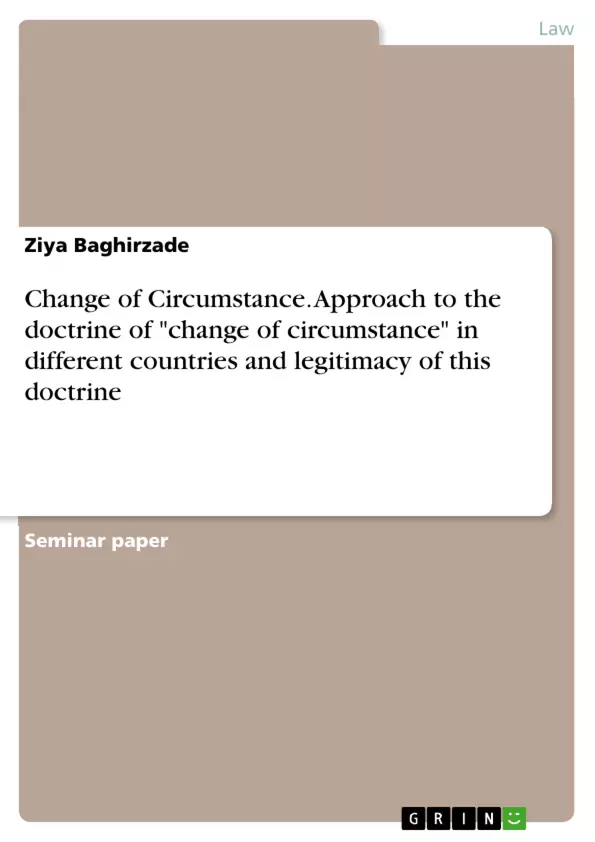This paper provides information about the doctrine of the “change of circumstance” and its approach in 3 different countries. Moreover, legitimacy and appropriate scope of the doctrine is assessed as the conclusion of the paper.
Inhaltsverzeichnis (Table of Contents)
- INTRODUCTION
- CHAPTER I People's Republic of China
- CHAPTER II ENGLAND
- CHAPTER III The United States of America
- CONCLUSION
Zielsetzung und Themenschwerpunkte (Objectives and Key Themes)
This paper analyzes the doctrine of "change of circumstances" and its application in three different countries: the People's Republic of China, England, and the United States of America. The paper assesses the legitimacy and appropriate scope of this doctrine, exploring how it is applied in different legal systems and the challenges it presents.
- The concept of "change of circumstances" and its legal implications.
- The development of the doctrine in various legal systems.
- The impact of unforeseen events, such as economic crises or disasters, on contractual obligations.
- The balance between contractual stability and the need to address hardship.
- The role of judicial interpretation in shaping and defining the doctrine.
Zusammenfassung der Kapitel (Chapter Summaries)
- Chapter I: People's Republic of China: This chapter examines the development of the doctrine of change of circumstances in the Chinese legal system, which is based on a socialist model. It traces the origins of the doctrine in judicial practice and explores how it was formally established through judicial interpretation. The chapter delves into specific examples of how Chinese courts have applied the doctrine to real-life cases.
- Chapter II: England: This chapter discusses the English approach to the doctrine of change of circumstances, known as the "frustration of contract" doctrine. It explores the key elements of this doctrine, including the concept of an unforeseen event that renders the contract impossible or radically different from what was originally contemplated. The chapter also examines relevant case law and considers the limits of this doctrine.
- Chapter III: The United States of America: This chapter analyzes the doctrine of change of circumstances in the United States, focusing on the concept of "impracticability" under the Restatement (Second) of Contracts. It highlights the key elements of this doctrine, including the unforeseen event, the material increase in burden, and the absence of assumption of risk. The chapter also explores the relationship between impracticability and the doctrine of frustration of contract.
Schlüsselwörter (Keywords)
The paper focuses on the doctrine of "change of circumstances", exploring its development, application, and legitimacy in various legal systems. Key terms include "frustration of contract", "impracticability", "force majeure", "hardship", "unforeseen events", "judicial interpretation", "contractual stability", "risk allocation", and "good faith". The paper examines the challenges and complexities associated with balancing contractual obligations with the need to address unforeseen circumstances.
Frequently Asked Questions
What is the legal doctrine of "change of circumstance"?
This doctrine allows for the modification or termination of a contract when unforeseen events occur that make the performance of the contract fundamentally different or extremely burdensome.
How does China approach the doctrine of change of circumstances?
In China, the doctrine was established through judicial interpretation, allowing courts to adjust contracts to maintain fairness when social or economic conditions change drastically.
What is "frustration of contract" in English law?
In England, frustration occurs when an unforeseen event makes the contract impossible to perform or transforms the obligation into something totally different from what was agreed.
What is the concept of "impracticability" in the US legal system?
Under the US Restatement (Second) of Contracts, a party may be excused from performance if an unforeseen event makes it "impracticable" (extremely difficult or expensive) without their fault.
How do courts balance contractual stability with unforeseen hardship?
Courts generally prioritize "pacta sunt servanda" (contracts must be kept) but apply these doctrines as exceptions to prevent gross injustice when risks were not assumed by the parties.
- Quote paper
- Ziya Baghirzade (Author), 2013, Change of Circumstance. Approach to the doctrine of "change of circumstance" in different countries and legitimacy of this doctrine, Munich, GRIN Verlag, https://www.grin.com/document/265961



